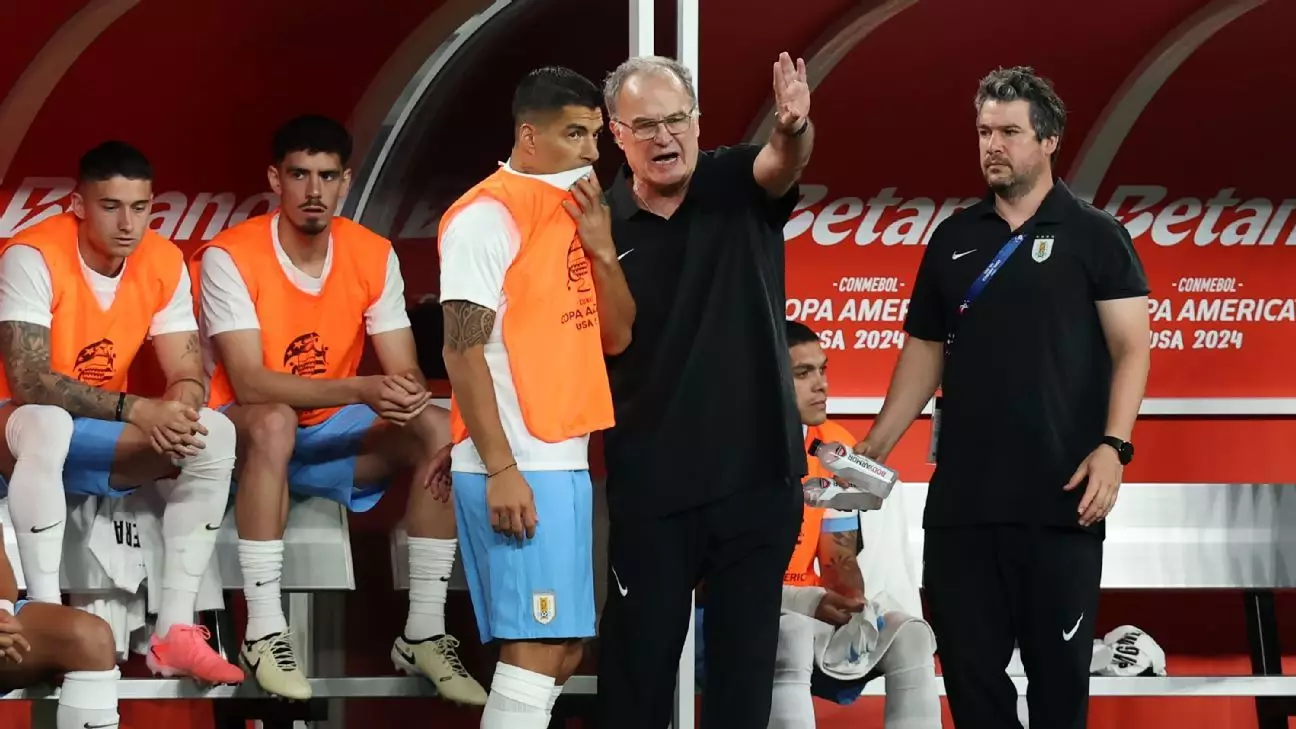In a candid reflection on the complexities surrounding the Uruguay national football team, veteran striker Luis Suárez voiced serious concerns about the management style of head coach Marcelo Bielsa during the 2024 Copa América. These revelations shine a light on the friction between the players’ experiences and coaching methodologies, raising questions about team dynamics and communication.
Since his appointment on May 15, 2023, Bielsa’s methodologies have transformed La Celeste’s operational environment. Suárez described it as a shift toward an unnaturally regimented atmosphere, with strict access controls even for team staff, which he found disheartening. “At the Celeste Complex, employees are not allowed to come in and greet us and eat with us,” he stated during a DirecTV interview. This separation was not merely logistical; it signified a deeper rift between the players and support staff, an issue that highlights the sometimes detrimental effects of a coach’s rigid approach on team morale.
Matias Vecino’s abrupt departure from the team served as an early warning sign of discontent. Suárez’s assertions regarding Vecino’s exit underscore the gravity of the situation. In various professional arenas, powerful leaders often inspire loyalty and camaraderie—qualities that seem to falter under Bielsa’s estrangement tactics.
Further complicating the atmosphere was the apparent breakdown in communication between the players and coaching staff. Suárez recounted poignant moments from the Copa América where basic courtesies, such as greetings, were neglected. “Many players held a meeting to ask the coach to at least say good morning to us, but he didn’t even say hello,” he shared, hinting that the distance extended beyond mere words—it reflected a lack of respect and cohesion.
The psychological effects of neglect in such settings can be profound, and it raises critical questions about the coaching philosophies that prioritize structure over interpersonal relationships. The importance of morale in competitive sports is well-documented; this void may have contributed to a stifled environment, which, while capable of producing results, can also lead to disillusionment.
Despite finishing third in the Copa América after edging out Canada in a penalty shootout, Suárez painted a bleak picture of the internal dynamics during the tournament. His experiences touch upon the essential balance between winning and maintaining a healthy team culture—an increasingly vital consideration in today’s sports landscape, where player wellbeing cannot be overshadowed by pursuit of trophies.
Suárez’s retirement from international football as Uruguay’s all-time leading scorer adds gravity to his opinions. With a record of 69 goals in 143 matches, his departure signals the end of an era for La Celeste. While Suárez has sought to influence his former teammates by engaging Bielsa in hopes of bridging divisions, his efforts yielded little, epitomized by the coach’s curt response to their dialogue.
As the World Cup qualifiers approach, Suárez emphasizes the need for understanding among fans regarding the team’s situation. With Uruguay currently in a promising position in the Conmebol rankings, the stakes have never been higher. Yet, caution is warranted as Bielsa’s management approach escalates tensions that could impact performance both on and off the field.
Sadly, the ongoing challenges illustrate how, even amidst a promising run, internal dysfunction can sour the atmosphere for players. Suárez’s poignant appeal to fans not to direct blame at the players for potential shortcomings serves as a sobering reminder of the complex nature of sports—a tapestry woven with threads of human emotion, professional aspirations, and sometimes, unavoidable interpersonal conflict.
Navigating these hurdles will require a concerted effort from both the coaching staff and players to foster an environment that values communication and camaraderie as much as it does performance metrics. As La Celeste embarks on their journey towards the 2026 World Cup, embracing a culture that uplifts and unites could be the key to transforming potential into progress. The pressure is intense, but so too is the promise of overcoming adversity, provided that all stakeholders remain committed to building a cohesive atmosphere for success.


Leave a Reply